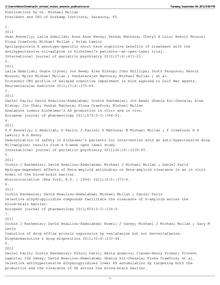Michael Mullan



Dr. Mike Mullan is a recognized authority on Alzheimer's disease and related disorders.[1] Dr Mullan is a co-discoverer of the first ever genetic causes of Alzheimer's disease. Consequently, he was a co-inventor on the original patents,[2][3] covering three mutations in the amyloid precursor protein (APP) gene linked to familial Alzheimer's disease. He also co-authored the nature and nature genetics paper describing these three genetic errors,[4][5][6] He was senior author on two of those manuscripts.[5][6] Dr. Mullan's Alzheimer work resulted in identifying a mutation which he named "the Swedish Mutation" [6] that is present in familial form. Transgenic Animal models for Alzheimer Disease frequently use the Swedish Mutation to reproduce features of the disease.
Dr. Michael Mullan was trained as a physician in England receiving his medical degree from the Royal Free Hospital, London University. As a physician, he won a clinical research fellowship in the UK and subsequently gained a PhD in molecular genetics, also from London University. In the UK and US he specialized in the diagnosis and treatment of Alzheimer's disease. He has co-authored over 200 papers on Alzheimer's disease and related disorders—on many of which he served as senior author. He has held positions as Professorial Chair and positions as professor of Psychiatry, Neurology, and Pathology. He cofounded the Roskamp Institute,[7] a not-for-profit, stand-alone biomedical research Institute and served in the past as the Director and CEO. Dr. Michael Mullan served as the CEO and Chairman of the Board for Rock Creek Pharmaceuticals.[8] Dr Mullan currently serves as the CEO of Archer Pharmaceuticals,[9] a for-profit spin-off of the Roskamp Institute. His work has focused on the development of new treatments for inflammatory disorders, particularly of the brain, with the ultimate goal of "reducing the burden of human suffering" associated with these diseases.
Co-founding the Roskamp Institute
Drs. Mullan and Crawford cofounded the Roskamp Institute with developer and philanthropist Mr. Robert Roskamp in Sarasota Florida in 2003.[10][11][12] Mullan and Crawford wanted to name the Institute after Mr. Roskamp and his family in recognition of their extensive contributions to the advancement of scientific research to find new treatments for neurological and psychiatric disorders. The Institute was established as a standalone biomedical state-of-the-art research facility to find the causes and new treatments for neuropsychiatric conditions.[13][14] In the mission statement of the Institute Mullan chose the phrase "to reduce the burden of human suffering" in reference to the mental and physical devastation that such conditions as Alzheimer's cause. The Institute is a multicultural multiethnic research environment combining a wide variety of expertise in molecular and cell biology, genetics, proteomics, lipidomics, medicinal chemistry, drug discovery and development. The Institute is a not-for-profit public charity funded variously by national peer reviewed grants from the Department of Defense, the NIH, the Veterans Administration and other agencies. The Institute also receives funding from the Roskamp foundation.
Under the directorships of Mullan and Crawford the Roskamp Institute focuses on discovering new treatments for Alzheimer's disease,[12] traumatic brain injury,[15] multiple sclerosis,[16] Gulf War illness[17][18] and other central nervous system disorders.
Swedish patent lawsuits
The patents covering the Swedish mutation became highly contentious as the mutation was successfully inserted into mice providing the first example of a transgenic mouse model of Alzheimer's Disease. These mice therefore had potentially great commercial and academic value. This mouse model has been used throughout the world and (often combined with other mutations causing Alzheimer's Disease) has provided the basis for research and drug discovery in both academic and commercial laboratories. Consequently there are thousands of papers citing the Swedish mutation and the Swedish mutation mice. Many lawsuits have contested the rights and use of the Swedish mutation and Swedish mutation mice including between the Mayo Clinic and Elan. In one such case, Avid Pharmaceuticals as defendants in the United Stated District Court for the Eastern District of Pennsylvania broke the validity of the Swedish mutation patents by gaining a verdict that John Hardy should have been an additional inventor on the Swedish mutation patents.[19] The patent was initially filed listing Mullan as the sole inventor. However, a federal jury found that John Hardy was a co-inventor. During the lawsuit, Hardy stated under oath that he had lied to his employer (Imperial College, UK) and Athena Neurosciences at the time about his contribution in order to establish a new career in the United States. British patent law stipulates that such inventions would be owned by the employer and not the employee.[20]
References
- ↑ https://www.researchgate.net/publication/24019468_Alzheimer's_Disease_Research_Scientific_Productivity_and_Impact_of_the_Top_100_Investigators_in_the_Field
- ↑ US 5877015, John Anthony Hardy, Marie-Christine Chartier-Harlin, Alison Mary Goate, Michael John Owen, Michael John Mullan, "APP770 mutant in alzheimer's disease", published 1999-03-02
- ↑ US 5795963, Michael John Mullan, "Amyloid precursor protein in alzheimer's disease", published 1998-08-18
- ↑ Goate A, Chartier-Harlin MC, Mullan M, Brown J, Crawford F, Fidani L, Giuffra L, Haynes A, Irving N, James L (1991). "Segregation of a missense mutation in the amyloid precursor protein gene with familial Alzheimer's disease". Nature. 349: 704–706. doi:10.1038/349704a0. PMID 1671712.
- 1 2 Chartier-Harlin MC, Crawford F, Houlden H, Warren A, Hughes D, Fidani L, Goate A, Rossor M, Roques P, Hardy J, Mullan M (1991). "Early-onset Alzheimer's disease caused by mutations at codon 717 of the beta-amyloid precursor protein gene". Nature. 349: 844–846. doi:10.1038/353844a0. PMID 1944558.
- 1 2 3 Mullan M, Crawford F, Axelman K, Houlden H, Lilius L, Winblad B, Lannfelt L (1992). "A pathogenic mutation for probable Alzheimer's disease in the APP gene at the N−terminus of Beta-Amyloid". Nature Genetics. 1 (5): 345–347. doi:10.1038/ng0892-345. PMID 1302033.
- ↑ "About the Roskamp Institute". Roskamp Institute. Retrieved June 6, 2016.
- ↑ "Our Leadership". Rock Creek Pharmaceuticals. Retrieved June 6, 2016.
- ↑ "Management & Scientific Team". Archer Pharmaceuticals. Retrieved June 6, 2016.
- ↑ http://www.businessobserverfl.com/section/detail/unstoppable-passion
- ↑ http://roskampinstitute.org/the-history-of-the-roskamp-institute/
- 1 2 http://health.heraldtribune.com/2014/10/28/sarasota-scientists-excited-potential-alzheimers-breakthrough/
- ↑ http://www.mysuncoast.com/health/sarasota-s-roskamp-institute-developing-groundbreaking-alzheimer-s-drug/article_cdd03f20-5fad-11e4-9356-0017a43b2370.html
- ↑ http://www.mysuncoast.com/news/local/roskamp-institute-scientists-searching-for-alzheimer-s-breakthrough/article_4d0c078a-2135-11e5-9787-0b2dfbb7ee69.html
- ↑ http://health.heraldtribune.com/2011/11/08/roskamp-institute-research-could-help-veterans/
- ↑ https://www.clinicaltrialsgps.com/florida/sarasota/roskamp-institute/facility-28007/
- ↑ http://www.research.va.gov/currents/1115-6.cfm
- ↑ http://www.bradenton.com/news/local/article44284230.html
- ↑ https://cases.justia.com/federal/district-courts/pennsylvania/paedce/2:2010cv06908/398886/345/0.pdf?ts=1376352919
- ↑ UK Patents Act, 1977, c.37
External links
- About the Roskamp Institute on the rfdn.org website.
- About the Mullan's Alzheimer Research on the Mullan Alzheimer Research.
- The mouse that trolled: the long and tortuous history of a gene mutation patent that became an expensive impediment to Alzheimer's research